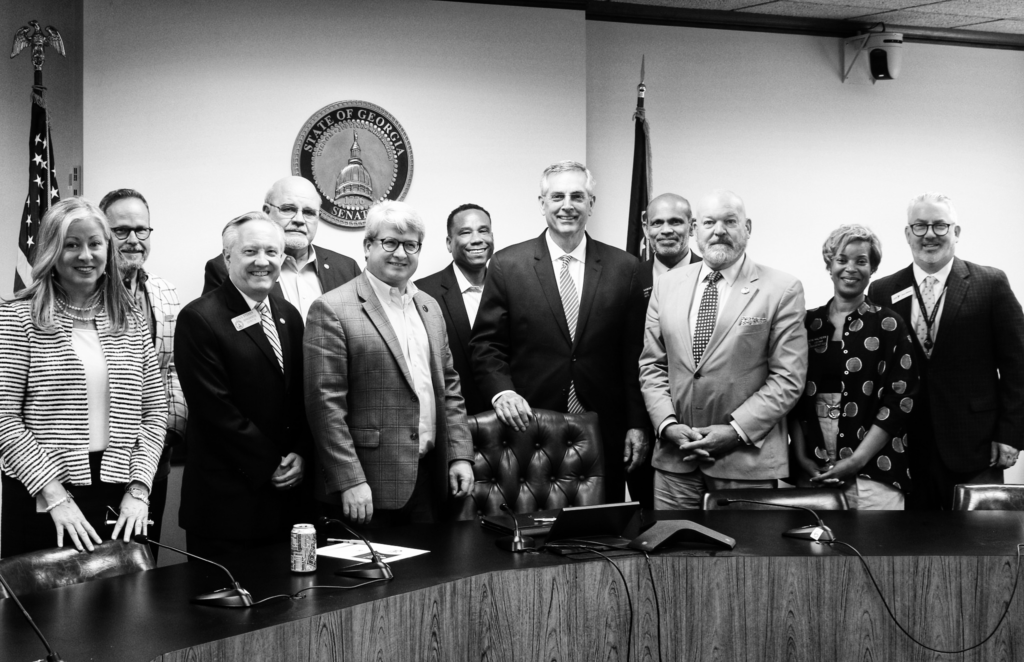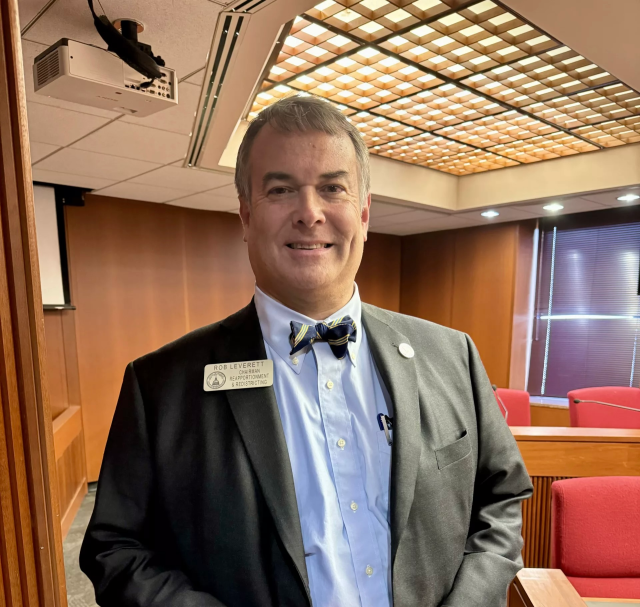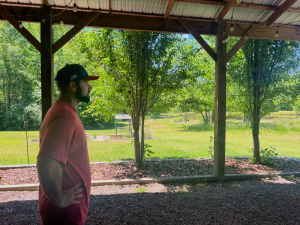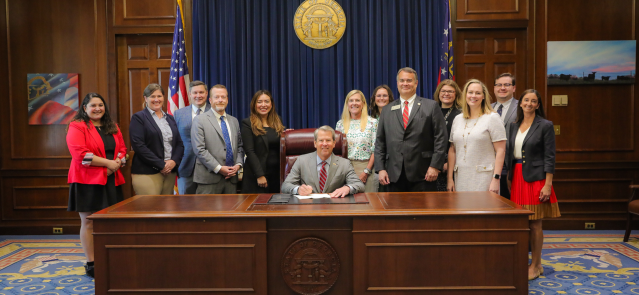Stay ahead of the curve as a political insider with deep policy analysis, daily briefings and policy-shaping tools.
Request a DemoA conversation with Secretary of State Brad Raffensperger


Brad Raffensperger is a busy man. Georgia’s elections czar’s schedule rivals that of other highly-sought-after, in-the-news politicians these days. Everyday, actually.
The Peach State’s 29th secretary of state has been very much in demand: speaking to the press, speaking to Congress, speaking to federal prosecutors. For the last several years, Raffensperger has been at the center of investigations, audits and grand juries regarding Georgia elections.
This week he met with federal prosecutors over ongoing investigations into former President Donald Trump’s meddling in the 2020 Presidential election.
Overseeing the state’s election system, which has been in the national spotlight over the last couple of years, isn’t the only part of Raffensperger’s job. His office is in the process of reviewing dozens of licensing boards.
The engineer-turned-millionaire businessman-turned-politician is a soft-spoken, deeply-religious man. In addition to the relentless election-related scrutiny he has faced, Raffensperger has had to endure the death of his oldest son in 2018.
He was deliberate and measured during his interview with State Affairs.
A Republican, he shared his life experiences in his 2021 book, "Integrity Counts,” where he refutes Trump’s false claims of voter fraud in the 2020 presidential election.
Like the movie 1993 Groundhog Day where the main character is forced to relive one day over and over again, Raffensperger is eager to remove himself from the ongoing loop of reliving – and retelling – his unwitting role in the 2020 presidential election controversy, one of the most unusual moments in American politics.
“The people of Georgia and myself, we’ve moved forward and we're focused on the future,” said Raffensperger.
This interview has been edited for clarity and length.
Q. Where did you grow up and what, if any, influence did that have on where you are today?
A. I was born in the southeastern part of Pennsylvania in a little town called Sinking Spring. We [he and his wife Tricia] moved [to Georgia] in 1982. This is where we raised our family and built our business. Georgia has probably had the greatest influence in my life. It was like growing up in Pennsylvania. The small town values. It's just been really a good state for us.
Q. Who or what has influenced you and why?
A. Obviously, your parents do. My dad Paul was a World War II navy veteran and engineer. My mom Barbara was a homemaker and later did real estate when we [he and his siblings] were in high school. That World War II generation were good people who tended to be hard-working. They had a great work ethic. It was the American work ethic.
Q. What led you to run for secretary of state?
A. The office of secretary of state is a great position for someone who has a business background. What you're really doing is you're operating things. You’re running things. You're managing things. Obviously, everyone knows the secretary of state oversees elections ... But the office also oversees registrations of corporations. I implemented the ability for business owners to renew their corporation for up to one, two or three years now. Twenty-five percent of all business owners in Georgia are using the two and three-year option.
Then there’s professional licensing. We have different boards — 140 different licenses. I'm a structural engineer, licensed civil engineer, also a licensed contractor, and nurses are among the largest profession. So I have professional respect and courtesy to everyone who holds a license. How do we prepare their licenses quickly? Right now we have a Licensing Reform Commission that we looked at. So what can we do to reduce barriers for employment for our fellow Georgians to get out there and make more money and deal with the fewest burdens placed in front of them from government agencies?
Q. Over the last few years, you've been at the center of investigations, audits and grand juries regarding Georgia elections. You and your family were harassed after you refused to honor former Pres. Trump’s request to find more votes. What do you wish the public knew about you?
A. I've been very clear that I will always make sure that I follow the law and follow the Constitution. What we do in this office is fiduciary. Our job is to make sure everyone knows we're going to have fair, honest and accessible elections. My job is to protect that.
Q. What’s the biggest lesson that’s emerged?
A. The people of Georgia are good. In spite of all those allegations that were made, in spite of the large proportion of Republicans that we have in our state, I was re-elected with the largest percentage victory of any office holder. And I think it was because I was standing for the rule of law and standing for the people.
That's the goodness of people. They want to know that the game is fair. That there’s someone there who is doing everything they can to make sure we have accurate, fair and honest elections. It really shows how good my fellow Georgians are and that's why it's an honor to represent the people of Georgia.

Q. How have the last few years of challenges changed you? Or has it changed you?
A. No. We keep doing what we're doing. We're focused on the 2024 election cycle.
Right now, we have our ongoing Secretary of State commission looking at licensing reform. What does that look like? We made sure a bipartisan commission was formed with four state senators and four state reps. We also have three people who have been on boards for over five years. We’re reaching out to key stakeholders like the Georgia Chamber, the Savannah Chamber and the Metro Chamber, so they can reach out to the business community. Then we can come back to the General Assembly next session and give them really good solid information and a solid action plan.
Q. The vulnerabilities in the Dominion voting software won't be updated before the 2024 presidential election. Does that concern you?
A. Our system is secure and battle-tested. And so is my team. We’re ready.
Q. You recently kicked off the 2024 election campaign by announcing the dates of the 2024 primary election. Are election workers still under the gun physically and emotionally? What are you hearing from them heading into the 2024 election?
A. We haven't seen that issue in Georgia because Georgia voters have moved forward. We just have a lot of good, kind, neighborly folks who show up to vote. And our election workers come from that same group of folks. They're just active in their community. So we feel really grateful for the participation we have.
Q. Senate Bill 202, passed in 2021, essentially took a good portion of the secretary of state's authority. For example, the secretary of state is no longer head of the state board of elections. Any thoughts on that?
A. We still have the constitutional authority for elections. I'm just merely not the chairman of the State Election Board. The State Election Board’s sole purpose is to hold counties accountable.
Q. Last week, the State Election Board voted unanimously to drop a potential state takeover of elections in Fulton County. Was that the right thing to do?
A. Fulton County has made improvements and they've [State Election Board ] done a deep dive on it. They've made their decision and I hope there’s continued progress for county elections as the largest [local elections board] county [in Georgia]. It's important that all 159 counties are performing at a very high level. I'm hopeful that Fulton County got the message and is going to continue improving their processes.
Q. Are there other local election boards that need to be run by the state or at least have the state look into their processes?
A. Well, that is a decision for the State Election Board.
Q. What are the biggest challenges going forward as secretary of state?
A. We're focused on 2024 and every election. We’re looking at any bad actors. And that’s why I call on the General Assembly to increase fines and jail time for anyone who attempts to hack into or somehow take possession of any equipment.
Q. Has that been a recent problem?
A. We had Coffee County [where there was a case last year of alleged post-election breach of voting equipment] and I believe there should be strong deterrents as critical national infrastructure as designated by the federal government. I need to make sure there are very stiff penalties for anyone attempting to delay our election system. So it'd be a 10-year prison term and a $1 million fine.
Q. What was your initial reaction when you heard about the Coffee County incident? And what did you feel your office could do at the time to address the issue?
A. We can’t comment on an ongoing investigation.
Q. Earlier this week, the U.S. Supreme Court rejected a legal theory that would have given state legislatures unchecked power to set rules for federal elections. Thoughts?
A. I would have to look at that. I'm an engineer, not a lawyer.
Q. Many states have left ERIC [the Electronic Registration Information Center]. Why did you stay?
A. It's the only system that is available nationally. It's a multi-state compact. When you join ERIC, you can share your data with other states. So, for instance, you can find out if people are still residents in your state who have moved to other states. It provides you with cleaner voter rolls. That's the only tool available to do that and that's why we are recognized as having the cleanest voter rolls in the entire country.
Q. What is the biggest misnomer about you and your job?
A. I don't think most people understand that we're involved in the corporate side of things and professional licensing security. It's a very broad-based office with oversight and responsibility of different areas.
Q. Have you thought about running for governor?
A. Well, I think people, you know, come up with all sorts of ideas. Right now, I'm focused on this job, the 2024 election and licensing reform.

the Bradford jay raffensperger Files
Title: Georgia Secretary of State
Age: 68
Birthplace: Sinking Spring, Pa.
Current residence: Johns Creek
Education: Bachelor’s in civil engineering from the University of Western Ontario and a master’s in business administration from Georgia State University.
Career: He is the CEO of Tendon Systems LLC, a contracting and engineering firm in Columbus and Forsyth County. He has a net worth of $26.5 million from his private sector work. He served on the Post 2 seat of Johns Creek City Council, 2012-2014, and was elected to the Georgia House of Representatives to represent the 50th district. He is elected secretary of state in 2018 and re-elected in 2022.
Hobbies: Golf
Family: He and his wife Tricia, his high school sweetheart, have three sons [their oldest son is deceased] and three grandchildren.
What job would you be doing other than your current one: In the words of country music singer Luke Combs, “I’d still be doing this, if I wasn't doing this.”
Reach out to Secretary of State Raffensperger on Twitter @GaSecofState and Facebook @GASecretaryofState.
Have questions, comments or tips? Contact Tammy Joyner on Twitter @lvjoyner or at [email protected].
Twitter @StateAffairsGA
Facebook @stateaffairsUS
Instagram @stateaffairsGA
LinkedIn @stateaffairs
Read more stories about Secretary of State Raffensperger:
Read this story for free.
Create AccountRead this story for free
By submitting your information, you agree to the Terms of Service and acknowledge our Privacy Policy.
Rural communities hopeful Kemp change to state soil amendment law will curb stink
After seven years and millions of dollars in restoration, Heritage GA opened its door last month to those seeking solitude and a chance to commune with nature. But the constant presence of trucks hauling a noxious concoction of waste byproducts from poultry processing plants threatens to ruin those plans.
The historic Catholic retreat sitting on 200 acres near Sharon is meant to be an economic boon and tourist attraction for Taliaferro (pronounced “Tolliver”) County, a poor, mostly Black county of 1,600, situated 90 miles east of Atlanta.
“It’s a very historic, sacred site. Our business is being threatened by this soil amendment. It’s [the retreat] been a major financial investment in the county and in the state and it’s really helping,” Betsy Orr, chief executive officer of Purification Properties LLC, which restored the retreat — a tribute to the first Catholic settlers who arrived in Georgia in 1790.
The sludge, known as soil amendment, is being transported to a hog farm about 1.5 miles from Heritage. The former hog farm was cited by the state Environmental Protection Division after residents complained that the waste being spread on the farm had polluted a nearby creek. The property owner resolved the consent order requiring him to pay $5,000, mark the buffer area on the farm and ensure no soil amendment is applied to that area, according to EPD spokesperson Sara Lips.
The Heritage property includes a commercial building, barn, cottages, prayer spaces, walking trails and the oldest Catholic Cemetery in Georgia. Orr predicts that if the smell from the former hog farm reaches Heritage, “it’s going to wreck our business.”
On Monday, Orr breathed an inward sigh of relief when she learned that Gov. Brian Kemp signed a bill into law that could prove fortuitous for landowners and other businesses battling problems created by soil amendment.
The new law adds a provision to the state Soil Amendment Act of 1976 that stops companies from hauling or receiving soil amendment if they’ve been notified by EPD to resolve an outstanding dispute or complaint. The notification is known as a consent order. The new law is effective July 1.
“It’s good because the state and the Agriculture Department have really prevented that kind of bill from being enacted because they say that it’s to the farmer’s benefit to be able to use the soil amendments,” Orr said.
Orr’s comments are a common refrain from business owners and families with properties in rural Georgia who sit near soil amendment sites and who complain of vultures, hordes of flies and unbearable smells floating across their properties.
“The problem is a lot of the soil amendments are causing pollution. They are stinky, nasty wastewater and other products,” Orr said. “Sometimes it is not even what they are allowed to dump. Finally, they have passed this amendment, and I hope they enforce it. Some of the things that these people are dumping are … ruining the landowners around them and the state has got to start caring about that.”
Doug Abramson, a retired corporate lawyer who lives in Wilkes County where a soil amendment runoff killed 1,700 fish in the Little River July 2022, called the new law “a step in the right direction.”
“Many counties throughout the state are encountering problems with sludge, improper dumping, and [other] soil amendment issues,” said Abramson, who along with his wife Susan have been working to address the problem for about a decade. “This [new law] is at least a recognition that there are problems out there. I do think the state could do better. The Department of Agriculture could do better but it is a step in the right direction.”
Have questions? Contact Tammy Joyner on X @lvjoyner or at [email protected].
Watch live: Kemp signs $36.1B budget bill
Today is the deadline for Gov. Brian Kemp to either sign or reject bills passed by the Georgia General Assembly during this past legislative session. Arguably, the biggest of those bills is the annual budget. Kemp and first lady Marty Kemp will be joined by Lt. Gov. Burt Jones, House Speaker Jon Burns, and members …
Bill adds violation to Soil Amendment Act, but will it stop the stench?
After years of enduring intrusive, foul-smelling waste spread on untold tracts of rural land, Georgians living near such sites are finally getting some relief.
On Monday, Gov. Brian Kemp signed into law a bill that adds a new violation to the state’s 48-year-old Soil Amendment Act. Soil amendment is meant to help farmers create healthier soil.
The law’s new provision is being hailed as a small but significant breakthrough in a 15-year battle to rein in abuses and mismanagement and create more safeguards and oversight in the disbursement of soil amendment. Many rural communities have long complained that the state-approved, sludge-like substance smells like “rotting corpses,” draws flies and vultures, and has led to other environmental problems.
Soil amendment is a state-approved additive derived from waste created mostly at chicken-processing and pet food-processing plants. It’s intended to be used as fertilizer on farmland where crops are grown. It’s supposed to help reduce erosion, improve water retention, change soil pH, pump up nutrients and provide other soil-boosting enhancements. Georgia law allows chicken processing waste to be applied to land as a soil amendment. Some farmers use it as a cheap alternative due to the rising cost of fertilizer.
The new provision, which goes into effect July 1, makes it illegal for a company to continue spreading soil amendment if the company or the site in which the waste is being distributed is under some kind of enforcement action from the state Environmental Protection Division or the state Department of Agriculture, the bill’s sponsor Rep. Rob Leverett, R-Elberton, told State Affairs Monday. Violators must be notified by the agriculture department and must resolve the prior problem before they can resume dispersing more soil amendment, he added.
“I’m very excited. I appreciate the governor signing the bill,” said Leverett who lives in Elbert County where some residents have had problems with soil amendment. “The passage of the bill indicates there’s some recognition by the Legislature that we do need to take a look at this. What I’m trying to do is address what I believe to be legitimate complaints. Hopefully, we started to do that this year and we’ll take other incremental steps as needed. I look forward to the Ag department enforcing this new violation once it’s gone through their regulatory process.”


David vs Goliath
In a state where agriculture wields tremendous power — it provides paychecks for 1 in 7 Georgians and contributes about $75 billion a year to the state’s economy, most of it from poultry processors — the new legislation is a milestone, local government officials and activists say.
“It is a very big step,” Tonya Bonitatibus, executive director and riverkeeper at the environmental nonprofit Savannah Riverkeeper, told State Affairs. “This bill made it through the Senate and the House Ag committees, which are traditionally definitely not in the business of overregulating Ag, and it passed almost unanimously [in the Legislature] and that speaks volumes.” Bonitatibus has been tracking the issue for 13 years.
While state lawmakers are recognizing the harsh impact the state’s poultry industry waste is having on some rural communities, leaders in those communities are waiting to see what the Georgia Department of Agriculture does. The department has sole power to regulate soil amendment.
“I hope the new [agriculture] commissioner Tyler Harper brings us more positive results,” said Oglethorpe County Commission Chair Jay Paul, a former state Environmental Protection Division specialist who dealt with soil amendment most of his 17 years with the agency. “I’m trying to give him the benefit of the doubt.”
Shortly after taking office in January 2023, Harper vowed to review the department’s Soil Amendment Program. Since then, he has issued recommendations and is beefing up the program, which when he arrived had only two people, one of whom was the inspector for the entire state. With $550,000 in funding from the state, Harper has added two more inspectors, a program manager and an attorney.
The department is updating its software so inspection reports can be completed digitally and tracked online rather than hand-written. It’s also updating its licensing and registration software to help registrants more easily comply with soil amendment program rules.
“Our team has done a really good job,” Harper told State Affairs. “We’ve really been working to get our arms around it since I walked in the door last year, and we’ve been committed to addressing the issue and ensuring that the agricultural industry can be successful and that we’re protecting our state, our resources and the public all at the same time.”
Rep. Robert Dickey, chairman of the House Agriculture Committee said Leverett’s bill is “about the [state agriculture] department having some teeth in the rules and law to really shut down” companies with abusive soil amendment practices.
The Ag department’s recent efforts are more than what’s been done in the past, critics say, but more needs to be done.
“I really haven’t seen a whole lot of difference. I mean, we’ve heard some good rhetoric,” Wilkes County Commission Chairman Sam Moore told State Affairs.
“Unfortunately, it’s the little bitty counties against the Department of Ag. And we lose every time,” Elbert County Commission Chairman Lee Vaughn said. “The Department of Ag has 100% control over what soil amendments are and what they allow and how they allow them to be applied.”
Local leaders in counties affected by the sludge onslaught say they’ve been kept in the dark for years about soil amendment. To make matters worse, they say they have no regulatory authority to resolve the problem because that’s left up to the state agriculture department.
“We want to know where it’s going. We want to know what it is,” Moore said. “I mean, we don’t even know if they [sludge-hauling companies] have a permit or not. You call the Department of Ag and they act like they don’t know. It’s just the same old thing that’s been going on for years.”
In the last year, some counties have started fighting back, creating local ordinances that discourage the sludge haulers from coming into their communities. At the same time, the problem has sparked activism among local residents in several counties where the problem prevails.
‘Death and Diarrhea’
State Affairs spoke to local government officials, activists, environmentalists, farmers and residents in a half dozen counties where soil amendment has been applied for years. Their stories all seem to align.
They talked about how their communities have been overrun with tractor-trailers hauling millions of gallons of sludge — or as locals call it “chicken blood and guts” — presumably from chicken and dog-food processing plants. The additive is being spread on open land in rural communities — usually small, sparsely-populated counties — across Georgia, with little state regulation, scrutiny or intervention.
The companies bringing in the waste have contracted with or paid farmers or landowners to apply it on their property. Some locals report seeing dozens of tanker-trucks a day hauling the waste into their communities. It’s an endless procession where the sludge is applied throughout the day, all hours of the night and even in the rain.

The usual hoot owls and honey bees have been replaced by vultures and flies, community members say. Millions of flies land on farm animals and get entangled in children’s hair when they play outdoors. In Hancock County, locals have resorted to firing shotguns in the air to scare away the vultures perched atop churches and other buildings. The vultures feast on the land where the soil amendment has been deposited.
“Buzzards or vultures, whatever you want to refer to them as, eat dead rotting flesh,” said Angela Walden who lives in Jefferson County, 45 minutes south of Augusta.
Dirt roads have become muddy, well-worn crevices as dozens of tanker trucks haul tons and of the liquid ooze into communities nonstop.
In most instances, the sludge is spread on top of the soil, locals and officials say, instead of injected into the ground, as the state requires, creating a horrific stench that stretches for miles.
“It smells like death and diarrhea,” said Patrick Dragos, a former Seattle ironworker who moved his wife and daughter to Jewell in August 2022. The family owns an historic wedding venue on a 42-acre estate with an 1895 Victorian home and barn near the Ogeechee River.


Dragos was so incensed after getting nowhere with state and local officials and the sludge-hauling companies that he is now running for chairman of Hancock County Board of Commissioners. The 34-year-old Republican is running against three Democrats, including the incumbent Helen “Sistie” Hudson who has held the seat since 2016.
“If they’re not going to handle our issues and take this seriously, I guess I’m going to have to do it myself,”Dragos said.
Problems began near the Dragos family’s Hancock County property in March 2023 when soil amendment was applied to a farm about a mile away. The smell and flies continued through October, leading Dragos to believe the problem was over. Then, the sludge-filled trucks returned in March of this year and have shown up frequently since then.

The family’s heading into a busy season of weddings, graduations and baby showers and never know when the trucks and smell will show up.
“The threat of the smell and flies is constant. So that stress is always there,” Dragos told State Affairs.
Dragos worries that nonstop application of the soil amendment may eventually seep into the water tables and eventually his well water.
It’s already created one environmental mishap.
In July 2022, some 1,700 fish died in the Little River in Wilkes County after soil amendment runoff from Mar-Leta Farms leached into the river, a Georgia Environmental Protection Division report found. The waste came from washdown water at a Hartwell County Nestle Purina facility provided by a company called Proponic Solutions, according to the EPD report. The report described the waste as “grey, turpid wastewater.” Mar-Leta, also known as McAvoy Farms, was later fined $85,000.
“It’s a major environmental concern,” said Paul, the Oglethorpe County Commission chairman. “And I’m not convinced that the fish kill in Wilkes County will be the last one because nobody really knows what’s in it. It’s just that simple. It comes as wastewater and suddenly goes on a truck and it becomes soil amendment.”
Fighting Back
Unable to get much help from the state agriculture department for years, some counties have taken steps to deal with the problem themselves:
In Warren County, companies wanting to apply soil amendment have to notify the county and get a permit to do so, Commission Chairman John Graham said. The companies also are limited to storing the sludge in certain industrial areas of the county and onsite for no more than 12 hours.
The ordinance was put in place about a year ago so that county officials “ would have more knowledge of what’s going on,” Graham said. “We’re going to stand on our ordinance. Our attorney put it together and he said he followed everything [based on the law]. He feels like we did the right thing.”
The issue had become such a problem that the county was forced to close one dirt road because “they had brought so many tanker-trucks of that stuff in, it messed up the dirt road. With all the rain we’ve had and them bringing in 20 trucks a day and that weight on a muddy dirt road just ruined it,” Graham said, adding that activity has “slowed down in the last little while,” Graham added.
Oglethorpe County created an ordinance last June that requires companies applying soil amendment on a tract of land to be at least 100 feet away from the property line of the nearest private property. During the 2021-22 legislative session, Senate Bill 260, sponsored by then-Sen. Tyler Harper, limited local buffers and setbacks to 100 feet.
“If we get a complaint, we will at least go out there and walk the perimeter of a property and make sure they’re not within 100 feet,” Paul said. “If we see something more egregious, like septage [human waste] for example, we can turn it over to the George Environmental Protection Division. It [Oglethorpe’s ordinance] does give us something new but that’s about it.”
Probably the strongest local government push back comes from Wilkes County. Two months ago, county leaders adopted an ordinance that requires landowners to prove they’re using the land where soil amendment is being applied to grow products, not just as a dumping ground. One soil amendment-application company sued the county two weeks ago saying the ordinance is illegal.
“Who knows what’s going to happen,” Moore, the Wilkes County Commission chairman, said when asked about the county’s chances of winning. “You would think we’d have a good chance. [But] We’ve been dealing with the state for so long, our expectations are not real high.”
Accidental Activists
The ongoing sludge fight has also created a motley mix of NIMBY activists.
Angela Walden and her husband had plans to build their dream home on their family’s nearly 200-year-old farm in Jefferson County. Those plans died on July 13, 2022 when they got the first whiff of a mysterious sludge that had been spread on her cousin’s farm across the two-lane highway dividing their properties.
A month later, Walden’s husband, who often tended the family farm after working his day job, got sick. He was vomiting. He had a sore throat, watery eyes and headaches. He was ultimately diagnosed with thyroiditis, a condition that occurs after coming in contact with hazardous toxins. That was the beginning of the Summer of Hell — 69 days of stomach-churning stench and flies — for Walden and her family.
It was also Walden’s swift induction into activism that would take her to the state Capitol to fight against the substance that ultimately caused a family rift that continues to this day.
“It’s small town, rural Georgians up against big industry,” said Walden, who has appeared in a Rural Georgia Protection Alliance documentary about soil amendment. “The chicken industry is big in our state. You’re going up against them, these lobbyists who have millions of dollars and big time attorneys. And you have the politicians. If I can just inform my county, my residents about what this really is and to try to keep it out of my community … that’s the best way to combat it.”
Walden wants to see regulatory authority over soil amendment removed from the state agriculture department and returned to the state’s Environmental Protection Division.
“That would be a huge win,” she said. “You know, we have to do what we can to try to bring some regulation and some oversight to what they’re doing.”
Have questions? Contact Tammy Joyner on X @lvjoyner or at [email protected].
House speaker Jon Burns hires new communications director
House speaker Jon Burns, R-Newington, announced today that he has hired a new communications director. Kayla Roberson, who has served as press secretary at the Georgia Chamber for the past year or so, will now oversee all external communications, media relations and strategic messaging for Burns.
“I’m excited to welcome Kayla to our team,” Burns said in a statement. “Kayla has an excellent background, deep skill set and strong work ethic, and we’re excited to have her on board to continue getting our message out and sharing the House’s priorities ahead of and into the next session.”
A double major in political science and journalism at the University of Georgia, where she graduated in 2022, Roberson interned for U.S. Rep. Andrew Clyde, a Republican in north Georgia’s 9th Congressional District, and worked as a consultant for GOP political candidates before joining the Georgia Chamber.
“I’m beyond grateful for the opportunity to work under the leadership of speaker Burns,” Roberson told State Affairs. “Whether it’s improving education opportunities, putting money back in the pockets of hardworking Georgians, creating jobs or supporting our rural communities, speaker Burns always prioritizes doing what is best, and what is right, for Georgia.”
Political strategist Stephen Lawson, who has held the top communications role for the speaker since last December, announced he’s joining Dentons, where starting today he’ll lead the global law firm’s public affairs efforts.
Have questions or comments? Contact Jill Jordan Sieder on X @journalistajill or at [email protected].




